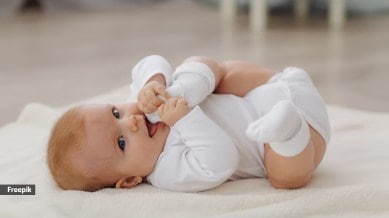📣 For more lifestyle news, click here to join our WhatsApp Channel and also follow us on Instagram
‘I eat very healthily…’: 66-year-old German woman gives birth to her 10th baby naturally, her 8th since turning 53; all about rare pregnancies and risks
Her oldest child, Svetlana, is 46 years older than Philipp, who was born in March this year

Alexandra Hildebrandt, a 66-year-old woman from Germany, gave birth to her 10th child earlier this year and says she’s unbothered by the raised eyebrows that often accompany her late-age pregnancies.
Her youngest son, Philipp, was born on March 19 via cesarean section at Berlin’s Charité Hospital. Weighing seven pounds, 13 ounces, the newborn was kept on oxygen for respiratory treatment, but his mother insisted that he was “conceived naturally and without difficulty.”
monthly limit of free stories.
with an Express account.
This is Hildebrandt’s eighth child since turning 53. “A big family is not only something wonderful, but above all, it is important for raising children properly,” she said in an email interview with TODAY.com.
Her oldest child, Svetlana, is 46 years older than Philipp. Still, Hildebrandt, a human rights activist, maintains a lifestyle she believes supports her ability to carry pregnancies well into her 60s. “I eat very healthily, swim regularly for an hour, walk for two hours,” she told German newspaper Bild, adding that she has never used contraceptives and does not smoke or drink alcohol.
The outlet also spoke with Hildebrandt’s gyanecologist Dr Wolfgang Henrich, who said that she had a “largely uncomplicated pregnancy.”
According to Germany’s DPA International, her 10 children include twins Elisabeth and Maximilian, both 12.
But, what are the key health risks involved in natural conception and childbirth for women in their 60s?
Dr Gaana Sreenivas, Obstetrician & Gynecologist at Bone and Birth Clinic and Rainbow Hospital, Bannerghatta Road, tells indianexpress.com, “While physical fitness and a healthy lifestyle certainly contribute to overall wellbeing, age remains a major independent factor in pregnancy risk. Natural conception in one’s 60s is exceedingly rare, and if it occurs, or if assisted reproductive technologies are used, the pregnancy is automatically considered high-risk.”
The primary concerns include a significantly increased risk of gestational diabetes, hypertension, preeclampsia, placental complications, and preterm labor. There’s also a higher likelihood of cesarean delivery and postpartum complications. “Cardiovascular strain during pregnancy is more pronounced in older women, even those who are fit, because the body’s physiological reserves naturally decline. Fertility also drops steeply after the early 40s, making pregnancies beyond 60 extremely uncommon without medical intervention,” states Dr Sreenivas.
How much do lifestyle factors contribute to maternal outcomes in advanced age pregnancies?
Dr Sreenivas notes that healthy habits are crucial in supporting any pregnancy and can help minimise risks. Regular exercise, a nutrient-rich diet, and avoiding tobacco or alcohol contribute to better cardiovascular health, stable blood sugar levels, and overall physical endurance, all essential during pregnancy.
“However, while these factors are protective, they cannot fully offset age-related biological risks, such as the increased chance of chromosomal abnormalities, reduced placental function, and diminished tissue elasticity. Lifestyle certainly enhances maternal and fetal outcomes but doesn’t eliminate the need for close medical supervision in pregnancies at an advanced maternal age,” explains the doctor.
Potential challenges of conceiving and then raising children for a mother in her mid-60s
Dr Sreenivas mentions, “For a mother in her mid-60s, fatigue and physical recovery may take longer. Even with excellent health, caring for young children, especially multiple toddlers or school-age children, can be physically demanding.”
Emotionally, she adds that there may be stress related to caregiving burnout, future planning, and ensuring long-term guardianship should health decline. “Logistically, managing schooling, healthcare, and day-to-day activities for many children requires significant support. A robust social, familial, or caregiving network becomes essential to ensure the well-being of both the parent and the children,” notes the expert.
DISCLAIMER: This article is based on information from the public domain and/or the experts we spoke to. Always consult your health practitioner before starting any routine.
📣 For more lifestyle news, click here to join our WhatsApp Channel and also follow us on Instagram